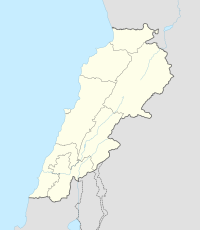Labweh
| اللبوة | |
| Location | 26 kilometres (16 mi) northeast of Baalbek |
|---|---|
| Region | Bekaa Valley |
| Coordinates | 34°11′50″N 36°21′09″E / 34.197317°N 36.352392°E |
| Type | Tells |
| Part of | Settlements |
| History | |
| Founded | c. 6910 to 6780 BC (from 3 limited samples) |
| Periods | PPNB |
| Cultures | Neolithic, Roman, Byzantine |
| Site notes | |
| Excavation dates | 1966, 1969 |
| Archaeologists | Diana Kirkbride, Lorraine Copeland, Peter Wescombe |
| Condition | Ruins |
| Public access | Yes |
Labweh (Arabic: اللبوة), Laboué, Labwe or Al-Labweh is a village at an elevation of 950 metres (3,120 ft) on a foothill of the Anti-Lebanon mountains in Baalbek District, Baalbek-Hermel Governorate, Lebanon.
The Neolithic settlements represented at Labweh have been found dating to at least the 7th millennium BC. It has been suggested that it was known to the Egyptians as Lab'u, to the Assyrians as Laba'u and as Lebo-hamath to the Hebrews. This has been associated with the Hamath mentioned in the Book of Kings and the Book of Ezekiel noted as the Northern border of King Solomon's territory. Labweh in the original Syriac tongue means "heart" or "center", it also has been suggested to come from the Arabic for "lion" or "lioness". The village has several archaeological sites of interest including three old caves with Roman-Byzantine sarcophagi and the remains of a temple. There are also remains of a Byzantine bastion and a Roman dam suggested to date to the reign of Queen Zenobia. Legend suggests that channels were carved through the rock to send water to her lands in Palmyra, Syria.
The village is located on a hill 26 kilometres (16 mi) northeast of Baalbek, which gives its name to the Labweh Springs and Labweh River, one of the sources of the Orontes. The Labweh river flows for approximately 20 kilometres (12 mi) through rocky desert. It then cascades into a lake and wider stream at another village called Er-Ras, considered to be the source of the Orontes. This flows onwards northeast, fed by numerous other streams from Lebanon's mountains.
...
Wikipedia

